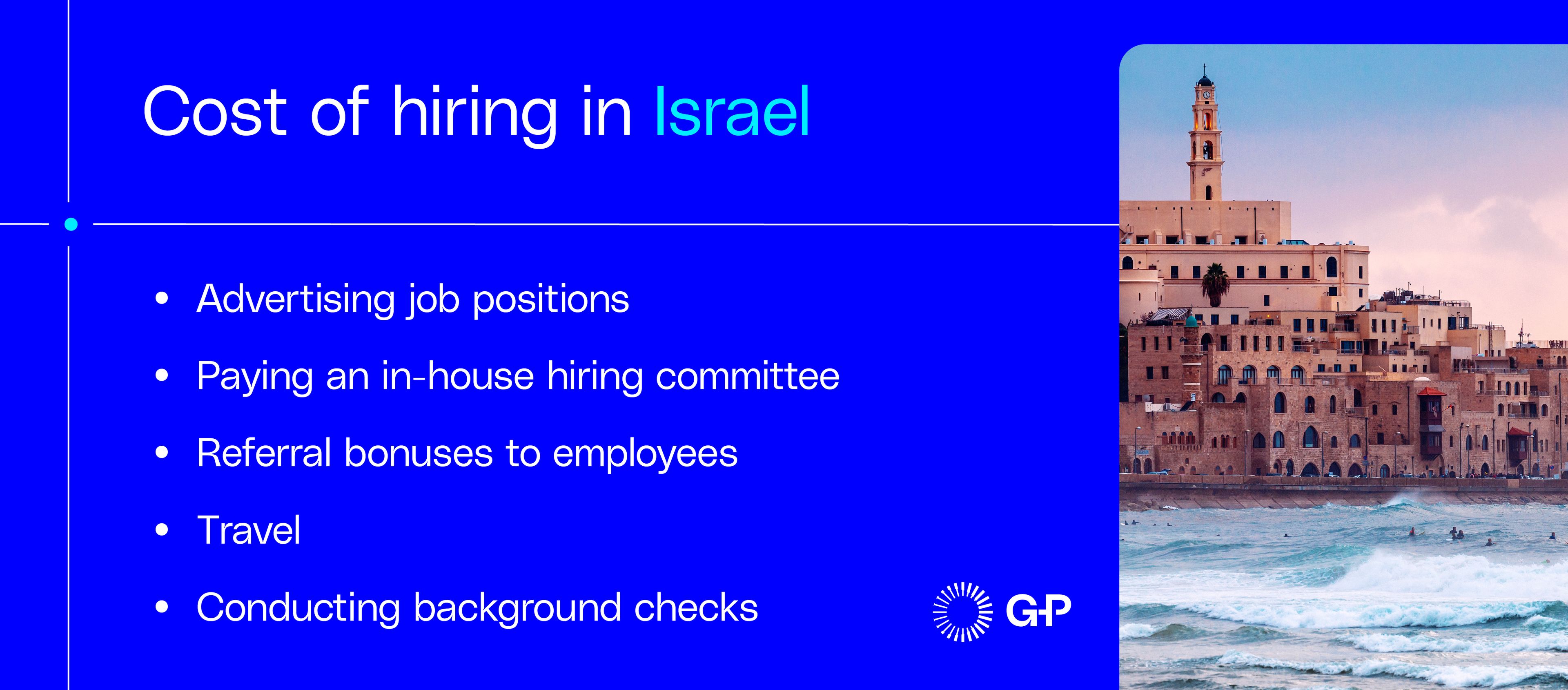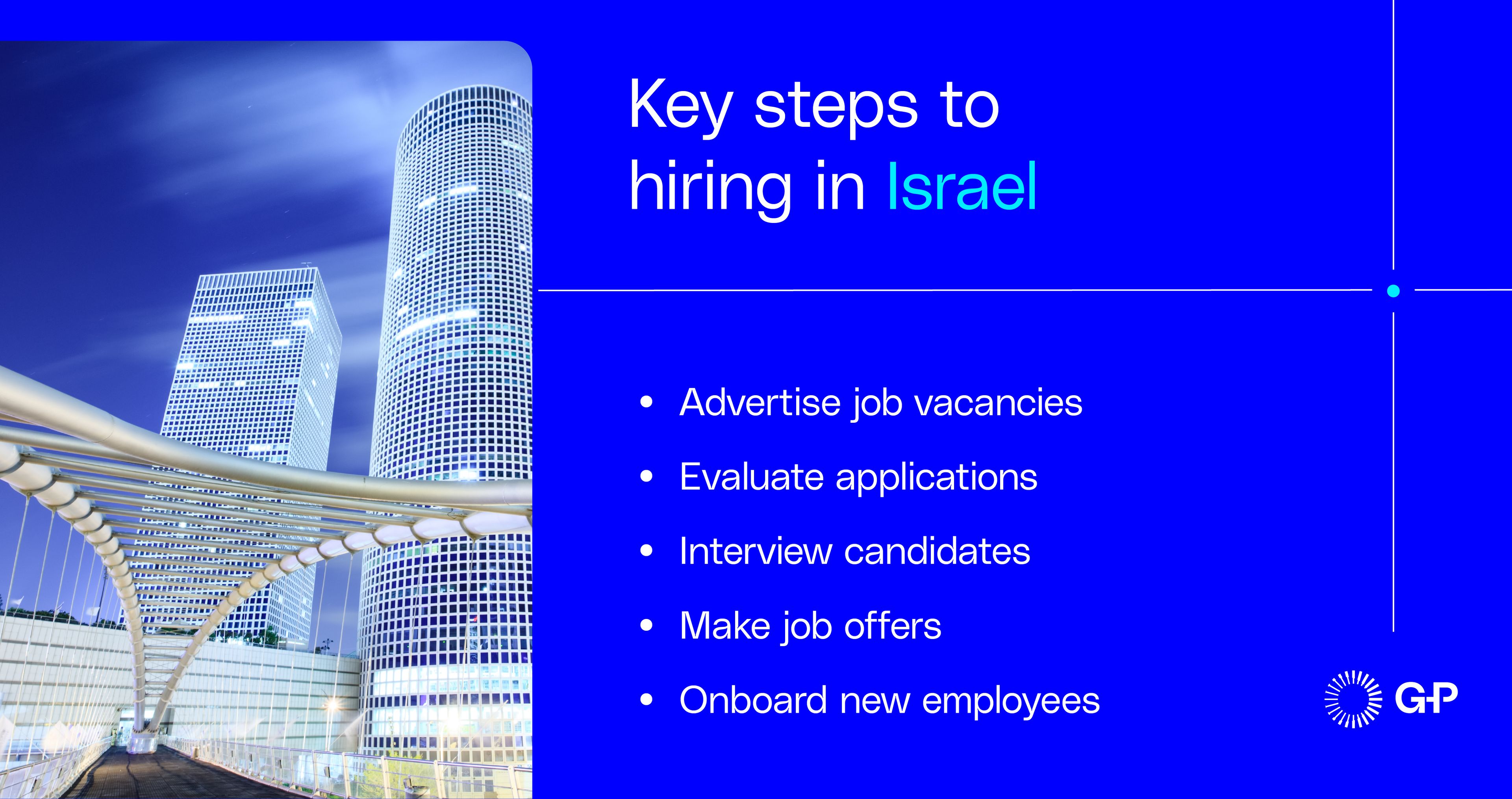Guide to hiring in Israel
Israel ranks high among OECD countries for its higher education rates. The workforce is multilingual. Common languages include Hebrew, English, Russian, Arabic, and French. Israel’s tech sector is a national strategic pillar, accounting for a big portion of GDP (around 17–20%). It’s a hiring destination for cybersecurity, AI, fintech, and deep-tech roles.
Before expanding into Israel, you’ll need to understand contracts, taxes, wages, benefits, and other employment laws. Our guide will tell you everything you need to know about hiring in Israel.
What to know before hiring in Israel

If you’re expanding your business into Israel for the first time, there are important legal requirements to be aware of. These norms and laws influence hiring practices in Israel and many aspects of the employer-employee relationship, including compensation and benefits.
G-P Gia™, our AI-powered global HR agent, can answer your toughest compliance questions across 50 countries — including Israel — and all 50 U.S. states. Reduce your reliance on outside counsel and cut the time and cost of compliance by up to 95% with Gia.
Here are four things to know about hiring in Israel.
1. Contracts and termination in Israel
Written and verbal employment contracts are legally binding in Israel. Written contracts are strongly recommended as they provide clear evidence of the agreed terms and are easier to enforce in disputes. Israeli law requires employers to give employees a written notice of employment terms within 30 days of starting work, even if a full contract isn’t signed yet.
Employment contracts have to include terms governed by Israeli labor law, such as compensation, benefits, working hours, vacation, sick leave, and termination conditions.
Israel doesn’t recognize at-will employment. Termination needs advance written notice (ranging from one to four weeks) or payment in lieu of notice. Employers have to conduct a pretermination hearing to give the employee a chance to respond to the reasons for dismissal.
Employees dismissed after one year of continuous employment get severance pay, calculated as one month’s salary per year of service. There are exceptions and nuances (e.g., resignation under certain circumstances can get an employee severance).
2. Payroll and taxes in Israel
Employers and employees contribute to Israel’s national insurance (social security) system. This covers unemployment, maternity leave, disability, old-age pensions, and more. National insurance contributions are withheld from employees’ paychecks, and employers remit both their own and the employee’s share. The contribution rates are tiered:
-
For employees earning up to 60% of the average wage, a reduced rate applies: approximately 7.05% (3.5% employee and 3.55% employer).
-
For earnings above 60% of the average wage, the full rate applies: approximately 19.6% (12% employee and 7.6% employer).
-
Employees pay a separate national health insurance contribution: full rate is 5% and reduced rate is 3.1%. Employers don’t contribute to the health insurance fund on behalf of employees.
The standard corporate income tax rate in Israel is 23% for most businesses. Technology companies and certain enterprises can be eligible for reduced rates under specific incentive programs. Dividend tax rates range from 25–33%, depending on the recipient’s status and the source of the dividend.
3. Wages and working hours in Israel
As of 2025, the minimum wage in Israel is ILS 5,300 per month.
The standard workweek is 43 hours (five days at nine hours per day), but some sectors or agreements call for a 45-hour week (six days at eight hours per day). The first two hours of overtime are paid at 125%. Subsequent hours are paid at 150%. Employees in hazardous or on-call positions receive extra compensation or bonuses.
Jewish employees get Shabbat (Saturday) as a rest day. Non-Jewish employees can choose their weekly rest day (Friday, Saturday, or Sunday), according to their faith and agreement with the employer.
4. Leave and benefits in Israel
Employees in Israel get paid leave on the country’s nine national holidays. Many workplaces have reduced hours or close during the intermediate days of Passover and Sukkot, but this isn’t a statutory requirement.
All employees get paid annual vacation. The statutory minimum is 12–14 days per year (depending on the workweek) for employees with up to five years of service. This increases with seniority. Vacation accrues from the start of employment. Full entitlement is granted after one year. Employees have to take at least seven consecutive days of vacation per year, unless otherwise agreed.
Employees get sick leave with a doctor’s note. The first day is unpaid, the second and third days are paid at 50%, and from the fourth day onward, sick leave is paid at 100% of the regular wage. Many employers pay from the first day as a benefit. National insurance covers sick pay only in certain cases (e.g., long-term illness after exhausting employer-provided sick leave).
Standard paid maternity leave is 15 weeks for employees who have worked at least 10 of the previous 14 months (or 15 of the previous 22 months). Shorter paid leave (eight weeks) is available for those with at least six of the previous 14 months of work. Maternity leave is paid by the National Insurance Institute (NII). Fathers get up to five consecutive days of leave immediately following the birth of their child. Three days are taken from their annual leave. The other two are deducted from their sick leave.
Parents get up to eight days per year to care for a sick child (12 days for single parents), with possible extension to 60 days for serious illnesses. Up to six days per year can be used to care for a parent or parent-in-law. Employees get seven days of paid leave following the death of a close family member.
All Israeli residents have universal health coverage through the NII. Pension contributions are mandatory for both employers and employees. The minimum rates are set by law, and most employees are covered by a pension plan from the start of employment.
Top hiring hubs in Israel
Some cities in Israel are known for particular industries. Knowing what each city has to offer allows you to focus your hiring efforts in the right place and fill roles faster.
The top talent hubs in Israel are:
-
Tel Aviv is the country’s main business and technology center. It’s home to a large startup ecosystem, multinational tech companies, financial institutions, and creative industries.
-
Herzliya is known for its high-tech companies. The city is a popular location for multinational R&D centers.
-
Jerusalem is Israel’s capital, with a strong presence in government, education, healthcare, and growing technology and biotech sectors.
-
Haifa is a major port city and industrial hub, with activity in technology, shipping, chemicals, and research, including the Technion – Israel Institute of Technology.
-
Petah Tikva is a center for healthcare, insurance, and high-tech. It has many corporate headquarters and business parks.
Key industries in Israel
Understanding Israel’s main industries allows you to benchmark salaries and benefits. You can use this insight to make smart choices about where to invest and grow your workforce.
The main industries in Israel include:
-
Software and IT services: Israel is a hub for software development, with strengths in cybersecurity, fintech, and AI. It has the world's second-largest number of startup companies after the U.S.
-
Aerospace and defense contracting: Israel’s defense sector produces military and civil aerospace technology that spins off into commercial high-tech applications.
-
Diamond industry: Centered in Tel Aviv, Israel is one of the world's largest centers for cutting and polishing diamonds. This is a big source of foreign exchange earnings.
-
Financial services: Israel’s domestic banking, insurance, and investment sector is adopting fintech innovations from its high-tech sector.
-
Natural gas: The discovery of large offshore natural gas fields has made Israel a regional natural gas producer and exporter.
Cost of hiring an employee in Israel

Whether you’re hiring one employee or an entire team in Israel, expenses are inevitable. Budget for the following:
-
Entity setup (unless you partner with an employer of record)
-
Job advertisements
-
Labor costs for applicant review
-
Payroll
-
Taxes
-
Salaries
-
Benefits
-
Bonuses
-
Allowances
-
Insurance
-
Travel
According to G-P Verified Sources fromGia, the employer burden rate in Israel, which includes costs triggered on top of salaries, is approximately 19–21%.
What does a company need to hire employees in Israel?
Make sure you cover these essentials before expanding your team in Israel:
-
Register your company with the Israeli registrar of companies.
-
Get a company number.
-
Register for a taxpayer identification number (TIN).
-
Register for VAT (if applicable).
-
Register for payroll tax and withholding.
-
Register with the national insurance institute (NII).
-
Set up pension fund arrangements.
-
Open a local bank account.
-
Register each new employee with Bituach Leumi.
-
Set up payroll systems.
Setting up an Israel subsidiary can take weeks or months. Use G-P EOR to hire full-time employees in Israel without setting up your own entity. Build your team in Israel at a lower cost and with peace of mind that you’re doing so compliantly.
Steps to hiring in Israel

The hiring process in Israel is similar to the one you’re likely familiar with in your own country. The hiring process follows five basic steps: advertising the job, evaluating applications, interviewing candidates, sending job offers, and onboarding new employees.
1. Advertise job vacancies in Israel
Create a detailed job description and define the role based on responsibilities and qualifications. Determine compensation and benefits in line with Israeli labor law. Under the Equal Rights for Persons with Disabilities Law, employers must ensure that job ads and recruitment processes are accessible to people with disabilities.
LinkedIn, Glassdoor, and JobMonster are popular job sites in Israel.
2. Evaluate applications in Israel
Collect applications and review resumes. Screen candidates based on their qualifications, experience, and fit for the role.
3. Interviewing candidates in Israel
Interview candidates who made it onto your shortlist. You can do these interviews in-person or virtually. Use structured, nondiscriminatory interview questions. Gia can help you create questions that follow anti-discrimination laws in Israel, so you can find the best fit for the role while complying with local regulations.
4. Making job offers in Israel
Contact your chosen candidate to offer them a position with your company. Prepare a compliant employment contract, Including all legally required terms (salary, benefits, working hours, leave, etc.). Both parties sign the contract before the employee starts work.
You must provide a written notice of non-selection for candidates who reached the final stages of the recruitment process but weren’t hired.
5. Onboard new employees in Israel
Now you can onboard new employees. Register your new hire with the NII. Set up payroll and pension fund contributions.
If you’re working with an EOR like G-P™, you won’t have to worry about the administrative burden of onboarding. We’ll streamline the process, so you can focus on training your new hire and integrating them into your company culture.
Hiring contractors in Israel
Working with independent contractors in Israel can be a cost-effective way to test the market and build a presence, without the commitment of full-time employees. Contractors based in Israel understand local consumer behavior, rules, and business practices. They’ll be ready to start working quickly with their own equipment and established work processes.
Hiring contractors allows you to easily adjust your workforce based on your business needs, without the complexities and costs of employment.
Before you enter an agreement with an independent contractor in Israel, consider the following:
1. Employees vs. independent contractors in Israel
It’s important to understand the difference between employees and independent contractors. In Israel, employers hire employees to do work and, in return, pay them a regular salary and benefits. Independent contractors provide services. Unlike employees, contractors set their schedules, use their own equipment, and work on specific projects rather than having an ongoing role.
2. Penalties for misclassification in Israel
Classifying someone as a contractor when they’re not can lead to severe penalties. If misclassification occurs, you’ll have to:
-
Back pay all employment-related benefits.
-
Back pay all social security contributions.
-
Face fines for violations of labor laws, including failure to provide written employment terms, noncompliance with minimum wage, and other statutory requirements.
3. How to pay contractors in Israel
G-P Contractor™ takes away the messy, time-consuming process of hiring and paying international contractors. You can create and issue contracts and pay contractors with just a few clicks, all while ensuring a compliant process.
Hire employees and contractors in Israel with G-P
Our SaaS and AI-powered products – EOR, Contractor, and Gia – support companies as they build and manage global teams.
G-P is the recognized leader in global employment with more than a decade of experience, the largest team of HR, legal, and compliance experts, and a global proprietary knowledge base.
Make your expansion to Israel easier with G-P. Contact us or book a demo today.





















